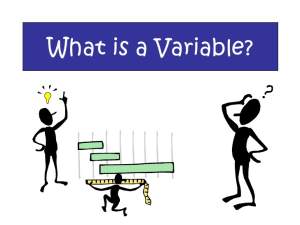

MedFriendly®


Variable
A variable is any characteristic or quantity in a
scientific experiment that tends to vary (change) or take
on different values while other factors or conditions
remain constant (unchanging). For example, age can be
a variable if a researcher tested people of different
ages. However, age can also be a constant if the
experimenter only wanted to test patients that are the
same age (for example, 50 year-olds). It all depends on
the type of study whether something is a variable or a
constant.
FEATURED BOOK: Science: The Definitive Visual Guide
Variables can be described as independent or dependent. An independent variable is one
that the experimenter has control over and can manipulate whereas the dependent
variable is what the researcher is measuring (the output or effect). For example, a
researcher may want to study if people are more likely to sneeze in response to salt or
pepper. In this example, the number of sneezes is the dependent variable whereas the
substance presented (salt or pepper) is the independent variable because that is chosen
by the researcher.
Variable also means being different in structure, function, form, or behavior. For example,
a personís nose may be variable in structure compared to most people. Lastly, variable
means tending to change. For example, the amount of hours someone sleeps per night
can be variable depending on the degree of stress one has been under that day. Variable
comes from the Latin word "vario"meaning "to change."
"Where Medical Information is Easy to Understand"™















